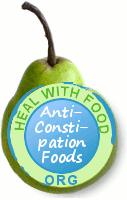10+ Foods That Help Prevent Constipation

Discover gut-healthy foods that help prevent and fight constipation and promote regularity! Below, we have listed some of the very best foods that for preventing constipation.
If you're looking for more general information on nutrition and constipation, visit this Guide's diet tips page. For healthy recipes that feature some of the best constipation fighting foods, visit this Guide's recipe page.
#1: Pears
Eating pears, as part of a healthy and balanced diet, may help combat constipation as these delicious fruits, once referred to as the "gift of the gods", contain a fair amount of fiber. But the fiber pears boast is hardly their only bowel movement stimulating feature: these juicy, sweet fruits are also a great natural source of sorbitol. Sorbitol is a known laxative which works by drawing water into the large intestine. When buying pears, it is wise to opt for organically grown fruit whenever possible; conventionally grown pears often contain high amounts of pesticides and other chemicals.
#2: Prunes
Prunes are a good source of dietary fiber which is the part of fruits and vegetables that the enzymes in your body cannot digest and that is therefore not absorbed into the bloodstream. As a result, fiber remains in the colon where it absorbs water and softens the stool, thereby preventing constipation. In addition to fiber, prunes contain mild colonic stimulants, which exert further beneficial effects on the bowels. (Note: If you're interested in more general information about the effects of prunes on human health, check out the page Health Benefits of Prunes.)
#3: Water
Although not a food, water is included in this list because of its crucial role in preventing constipation. Without an adequate intake of water, a high-fiber diet will not be able to stimulate the bowels and improve waste elimination. In fact, an insufficient intake of water combined with a high-fiber diet can have the opposite effect and precipitate constipation. Most experts recommend drinking at least 8 glasses of water a day, but if your diet is very high in fiber your body may require even more water. Also hot weather and physical activity increase the body's requirement for water.
#4: Figs
Figs are an old standby remedy for constipation. To fully benefit from their laxative effect, eat them with their skin as most of their fiber is in the skin. When buying figs, look for fruits that are plump and soft, but not mushy. They should also be free of bruises, have a deep color, and smell fresh and mildly sweet. Figs are one of the most perishable fruits and therefore it is advisable to buy them only a day or two before you plan to eat them. Dried figs, which have a shelf life of over a year if stored appropriately, are also an excellent remedy for constipation.
#5: Beets
Munching on red beets is a great way to prevent and treat constipation. Beets are high in fiber that helps keep waste materials moving through the intestines at a healthy pace. Also the green leafy tops of beets are high in fiber and can be cooked like spinach. In addition to supporting healthy bowel movement, beets contain some extraordinary properties that make them a super food for the colon. Several studies have shown that betacyanin, a phytochemical compound responsible for beets' intense purple color, is highly effective at fighting cancer, particularly colon cancer. To maximize beets' cancer-fighting properties, cook them only lightly. Research suggests their anti-cancer activity is reduced by heat.
#6: Papaya
Originally from Central America, the papaya plant is today cultivated in most tropical countries. Termed as the "fruit of the angels" by Christopher Columbus, papaya is a true nutritional powerhouse. It is also a great food to add to your diet if you suffer from digestive complaints, in particular constipation. Papaya is one of the best fruit sources of vitamin C which helps soften the stool (papaya contains even more vitamin C than oranges). But vitamin C is hardly the only feature that makes papaya effective at promoting digestive health. Papaya contains papain, a protein-digesting enzyme, as well as a number of other active compounds that have been shown to ease constipation. Papain is more concentrated in green unripe papaya than in ripe papaya. Green papaya, which is often more readily available in Asian food stores, makes a nice addition to salads.
#7: Spinach
Popeye was right about one thing: spinach is good for you! Spinach is an excellent health food and an important vegetable for anyone suffering from constipation. It is considered one of the best vegetables for the entire digestive tract, and it is thought to be highly effective at cleansing and regenerating the intestinal tract. One of the gut health promoting compounds contained in spinach is magnesium which appears to be necessary for proper bowel movement. Mild deficiencies of magnesium are common in countries where consumption of processed and refined foods is common, as processing can remove significant quantities of magnesium from foods. Also intensive farming can reduce magnesium content of plant foods by depleting the soil of this important mineral.
#8: Okra
Don't be put off by okra's somewhat slimy texture — this extraordinary plant native to West Africa is an amazing functional food for maintaining a healthy gut. The okra fiber absorbs water and adds bulk to the stool, which causes it to move through the intestines faster, helping to prevent constipation. Okra's mucilage lubrificates and soothes the intestinal tract, further facilitating painless elimination of waste. When buying okra, look for fresh, firm, bright green pods that are no longer than 4 inches. To prepare okra, cut off both ends of the pods, wash them in cold water, and cook in a saucepan or a steamer. To retain most of okra's healthful nutrients and enzymes, it should be cooked as little as possible. Thin slices of raw okra added to a bowl of salad greens also make a healthy and delicious dish.

